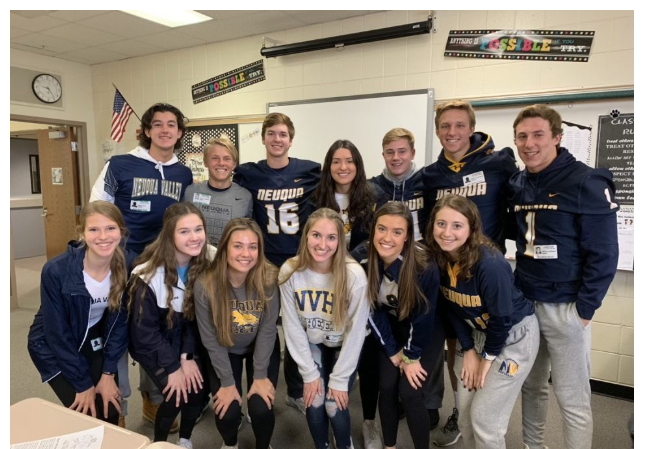More than just athletes: athletes leap into leadership
JKB members at middle schools talking to kids about mental health
November 7, 2019
Athletes are usually admired because of their abilities on the court or on the field. However, leaders in the Jake Kyle Braid club are taught to be positive role models off the court and the field as well. The JKB program was made by the parents of Jake Kyle Braid. He was being pushed by his coaches to be better than he was before. He was a sophomore on varsity and with that comes a lot of pressure to be the best. So in order to achieve more things he started using steroids without his friends or family knowing. The steroids caused him to have impulsive and depressive behavior and eventually he ended his own life. His parents later found out that he was trying so hard to be the best he could be and he was devastated to find out their son was going through something so big without talking to them. His parents then founded a program that takes high school sophomores to a camp for a week, completely free of charge, where they are taught how to be leaders. After the week-long instructional camp, they are told to bring what they learned back to their hometown and lead the way for others. However the camp has since been cancelled because eventually the cost of it got to be too much without being funded by anyone. The athletes are encouraged to look for the students like Jake, people who are struggling but have not spoken up. Jake Kyle Braid’s parents want to make sure that other parents don’t lose their child like they did.
Neuqua has been involved with this program since 2000 and had students go to the camp before it got cancelled. However the club is going strong at Neuqua and they are still finding new members. The complete interview process is very intense, because they want to find the best candidates. The student must first be nominated by one of their coaches. Once nominated Mr. Figi, and he sends the student’s photos and name throughout the school trying to figure out what kind of person they are. They don’t want to pick someone who just looks like a good leader on paper. They want them to actually live out their leadership. Club leader Clayton Figi says, “a leader does what they’re supposed to do when no one is watching.” He wants to make sure that the people he chooses are actually someone who lives up to how they look on paper. After they go through the process of collecting the reputation of the individual by everyone they can, they send the candidate a letter to explain what the program is. If there is an interest in it, then they will continue with the interview process. They sit the person down in a room with two faculty leaders and members that are already a part of the club, and they question the person to the best of their abilities. They ask about what they are involved in, and how they see themselves as leaders, and try to figure out if this athlete would be good enough for their program. At the end of all the interviews, they pick five girls and five boys to be the newest edition of the club.
Different schools do different things in order to change their community for the better. In the middle of November, Neuqua’s JKB program helps Linden Oaks, a behavioral health facility for people struggling with mental health issues, by making comfort boxes for the members there. This idea came from one of their own members who spent time there and wanted to give back to them because they did so much to help her. They also go to middle schools and speak at health classes. They talk about what it means to be mentally stable and how to manage stress. And are trying to make sure The group members of JKB are planning on doing their own smaller camp for captains of all types of sports to try and make leaders that know the warning signs of when someone might be in need of help.


